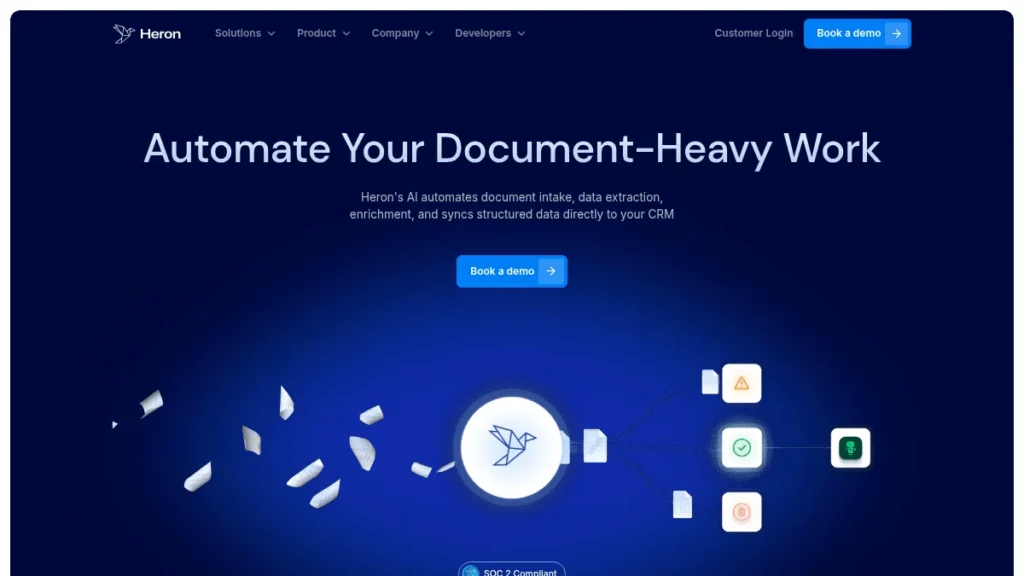The recent $16 million Series A funding round secured by Heron, officially named Open Credit Technologies, underscores the accelerating evolution of automation tools in niche markets such as business lending and insurance. Led by Insight Partners, with participation from notable investors like Y Combinator and Flex Capital, this funding will enhance Heron’s capabilities in AI document automation. Such advancements are making significant waves, particularly for small to medium-sized businesses (SMBs) with limited engineering resources. The influx of capital positions Heron favorably against competitors, as its unique approach emphasizes vertical-specific AI solutions.
Heron focuses on integrating AI-driven automation directly into existing workflows. This integration is crucial for SMBs, which often lack the capacity to implement large-scale automation solutions. The platform’s seamless connectivity with popular software such as Salesforce, Zoho, and Quickbase allows companies in the financial services sector to leverage advanced technology without overstretching their existing infrastructure. This flexibility contrasts sharply with broader robotic process automation (RPA) tools that may require significant system overhauls.
As businesses increasingly recognize the need for optimization, they often find themselves at a crossroads of automation software choices. In this context, a comparison between Heron’s solutions and those of general RPA providers like UiPath and Automation Anywhere quickly reveals distinctions. While general RPA tools can automate various business processes, they often lack the nuance required for vertical-specific tasks. Heron’s focus on automating document-heavy processes within sectors like insurance and finance means it can deliver higher ROI for companies dealing with substantial paperwork. Companies leveraging Heron can experience upticks in operational efficiency driven by its ability to handle high-volume document processing—over 350,000 documents weekly in the case of its current clientele.
However, the capacity for scalability is a vital consideration. RPA platforms like UiPath and Automation Anywhere frequently tout extensive scalability and can cater to larger enterprises with broad needs. Yet, Heron’s trajectory indicates that SMBs can harness AI-driven efficiency without the burden of expensive licensing fees typically associated with enterprise solutions. Therefore, while UiPath and Automation Anywhere offer versatility, Heron’s specialization may drive higher immediate value for SMBs focused on automated document tasks.
An additional comparative layer can be seen in the AI space, particularly when juxtaposing natural language processing tools like OpenAI and Anthropic against specialized automation platforms like Heron. OpenAI’s models are known for their flexibility in understanding and generating human-like text, making them versatile for a myriad of applications. However, this generality also means they may lack the fine-tuned efficiency that task-specific tools provide. Heron’s self-learning capabilities adapt specifically to client workflows, automating mundane tasks while allowing personnel to concentrate on higher-value activities. For SMB leaders, these differences can translate into time savings and increased productivity that is reflected in bottom-line gains.
Concerning costs and ROI, Heron’s value proposition appears compelling. The initial investment in Heron’s platform is typically lower than the enterprise-level pricing of broad automation suites. For small to mid-sized businesses grappling with cost constraints, this makes adopting Heron’s solutions a more attractive business case. Furthermore, with the company recently tripling its revenue and expanding its client base to include over 150 customers, including U.S. insurance providers and FDIC-insured banks, Heron stands as a candidate that can effectively scale operations without sacrificing quality.
Challenges remain, especially regarding the adaptability of AI-based solutions. While businesses may initially see promising engagement metrics, the ongoing need for fine-tuning and system updates can incur additional costs and resource allocations. However, Heron’s focus on vertical-specific automation reduces the potential for issues common in overly general solutions.
Moreover, as the company expands into other industries, it poses an intriguing opportunity for its existing clientele to anticipate future integrations that may further enhance their operational capabilities. With technological advancements and market dynamics shifting rapidly, the willingness of SMBs to adopt and invest in tailored automation solutions could very well distinguish the market leaders of the coming years.
In conclusion, the rise of specialized AI platforms like Heron presents notable implications for SMB leaders and automation specialists navigating a crowded market. The emphasis on vertical-specific solutions provides a competitive edge that may drive higher returns when compared to generalist RPA tools. These advances signal not only a business opportunity but also a strategic imperative for effective resource allocation and enhanced operational efficiency.
FlowMind AI Insight: The current landscape indicates a clear shift toward specialization in automation solutions. Companies focused on specific market needs like Heron are likely to deliver superior ROI for SMBs, challenging broader competitors by providing customized efficiencies that resonate with today’s evolving business demands.
Original article: Read here
2025-07-16 07:00:00

